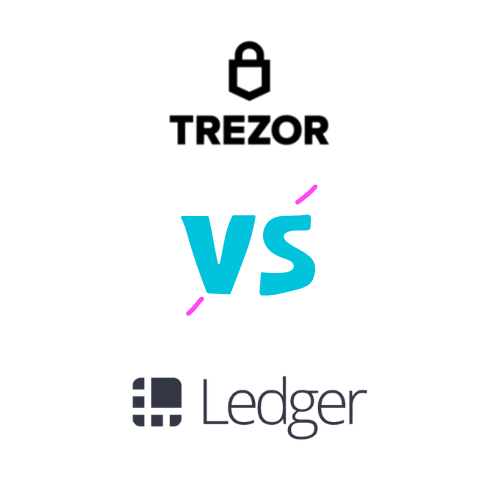Hardware wallets are considered the most effective solution when securely storing your cryptocurrency. Two of the leading solutions you’ll find in stores are Trezor and Ledger, but which one is right for you? This article will evaluate these two wallets based on ease of use, security levels, supported coins, and other considerations such as price point, design quality, and portability. Additionally, we’ll look at integration options plus any additional features that come with each wallet, customer support availability, and community reputation so that you can make an informed decision!

Ease of use
Both Trezor and Ledger are easy-to-use, but Trezor has a slight advantage. With its straightforward interface that simplifies navigating and managing your digital assets, you’ll be up and running in no time. Although the Ledger may appear more complex at first glance, both companies have been making strides to make their interfaces user-friendly for all levels of cryptocurrency users.
Security
Trezor and Ledger are the most reliable choices for safeguarding your cryptocurrency. Both wallets have hardware and software security measures to shield your digital wealth. Trezor takes it a step further with its passphrase feature, allowing you to add an extra layer of safety when storing your crypto assets.
Ledger offers an added advantage of a built-in screen that allows you to check and confirm all transactions before they are approved. Additionally, both wallets offer a restoration seed feature that can be used to restore funds if the wallet is lost or stolen. Moreover, these two devices run on the BOLOS technology - a secure element that permits multiple applications usage at any time.
Supported coins
With a vast selection of coins to choose from, Ledger provides the upper hand in this comparison. Supporting over 1,500 different coins and tokens means you’ll have no trouble finding what you’re looking for. However, it’s worth noting that Trezor is working hard to develop additional support for more stablecoins and rapidly expanding its supported coin list with new additions all the time!
Price Comparison
When choosing the right model, price is an important factor to consider. The Trezor Model T retails at a slightly higher cost of $150, while the Ledger Nano X costs around $130. Although this difference isn’t significant, it should be noted that Trezor offers more features than its counterpart. If you’re looking for something even cheaper but with similar performance options, go for the Ledger Nano S, which retails at just about $60!
Design and Portability
Featuring a sleek and modern design, Trezor Model T has the edge over Ledger Nano X due to its larger screen and more compact size. Both wallets are so small that you can easily fit them in your pocket for maximum convenience - making them easy to carry around wherever you go!
Integration with other platforms
Conveniently integrate Trezor and Ledger with various mobile, desktop, and web wallets or the optional browser extension for Trezor (Trezor Bridge). With its accompanying wallet app - Ledger Live – users can swiftly manage their assets on the go.
Additional features
Trezor’s Model T was designed with the user in mind, providing a touchscreen display that confirms your transactions with a simple tap. On the other hand, Ledger Nano X stands out due to its Bluetooth capabilities; you can now connect it to any mobile device and effortlessly manage all of your digital assets!
Customer support
Trezor and Ledger understand that customers need help, so they’ve assembled a customer service team to answer your inquiries or troubleshoot any issues. Furthermore, their websites are stocked with comprehensive documentation and troubleshooting guides if you prefer to tackle the problem yourself.
Trezor is renowned for its exceptional customer service, as many customers highly acclaim their prompt response times and accommodating assistance. Similarly, Ledger boasts a strong customer support team that provides thorough elucidations and solutions to user issues.
Community and Reputation
Trezor and Ledger are both highly respected amongst the cryptocurrency population. Trezor has been a mainstay on the market since 2013, while Ledger was established in 2014 and continues to expand its reach. Both companies have vibrant user bases that consistently provide meaningful advice that helps shape their products for the better.
Company Background
Marek Palatinus and Pavol Rusnak, two Czech software developers, created Trezor, while Eric Larchevêque, a French crypto enthusiast, spearheaded Ledger’s founding. Both businesses are manned by an experienced team of engineers who constantly strive to strengthen their product security and capabilities.
Real-world usage scenarios
If you’re seeking secure, long-term storage of your crypto assets with a user-friendly interface, Trezor is the ideal choice. It’s perfect if you have large amounts of digital currency to manage in one place. Alternatively, Ledger might be better suited for those who are frequently on the go and would like to access their funds anywhere they may travel easily. Its Bluetooth capability permits you to effortlessly connect it to your mobile device so that no matter where life takes you, you can always keep track of your investments!
Ultimately, the decision between Trezor and Ledger boils down to your requirements and preferences. With that said, if you’re looking for an uncomplicated interface with a touchscreen display, then Trezor is probably your best choice. On the other hand, if you need additional versatility in terms of supported coins or require mobility when managing assets on the go, then Ledger might be a better fit. Rest assured, though, that both wallets offer impressive records regarding customer service excellence and security measures - they have earned outstanding reputations within their respective communities too!
Trending posts: Which altcoins will survive the BEAR market? | Crypto Tokens With Big Return 2022 | Kaspa Wallet | Features, types, how to send & receive funds
Trending reviews: Infinity Wallet Review | Ethos Coin & Wallet Review | ETHLend Review | Switchere Review | Trezor Wallet Review | Ledger Wallet Review | KeepKey Wallet Review
Follow Verge Hunter on: Twitter | Facebook Page | Facebook Group | LinkedIn | Google News

